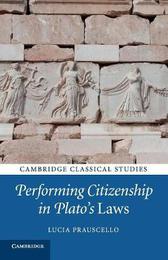
|
Performing Citizenship in Plato's Laws
Paperback / softback
Main Details
| Title |
Performing Citizenship in Plato's Laws
|
| Authors and Contributors |
By (author) Lucia Prauscello
|
| Series | Cambridge Classical Studies |
|---|
| Physical Properties |
| Format:Paperback / softback | | Pages:282 | | Dimensions(mm): Height 217,Width 140 |
|
| Category/Genre | Social and political philosophy |
|---|
| ISBN/Barcode |
9781107421165
|
| Classifications | Dewey:321.07 |
|---|
| Audience | | Professional & Vocational | |
|---|
|
Publishing Details |
| Publisher |
Cambridge University Press
|
| Imprint |
Cambridge University Press
|
| Publication Date |
19 October 2017 |
| Publication Country |
United Kingdom
|
Description
In the Laws, Plato theorizes citizenship as simultaneously a political, ethical, and aesthetic practice. His reflection on citizenship finds its roots in a descriptive psychology of human experience, with sentience and, above all, volition seen as the primary targets of a lifelong training in the values of citizenship. In the city of Magnesia described in the Laws eros for civic virtue is presented as a motivational resource not only within the reach of the 'ordinary' citizen, but also factored by default into its educational system. Supporting a vision of 'perfect citizenship' based on an internalized obedience to the laws, and persuading the entire polity to consent willingly to it, requires an ideology that must be rhetorically all-inclusive. In this city 'ordinary' citizenship itself will be troped as a performative action: Magnesia's choral performances become a fundamental channel for shaping, feeling and communicating a strong sense of civic identity and unity.
Author Biography
Lucia Prauscello is University Senior Lecturer in Classics at the University of Cambridge and a Fellow of Trinity Hall. She has published on Greek philology, literature and music. Her monograph Singing Alexandria: Music between Practice and Textual Transmission was published in 2006.
|